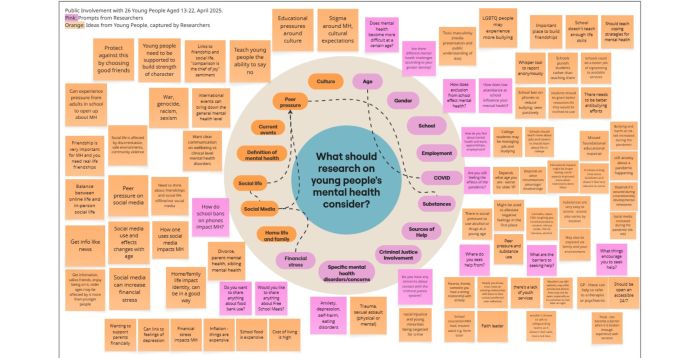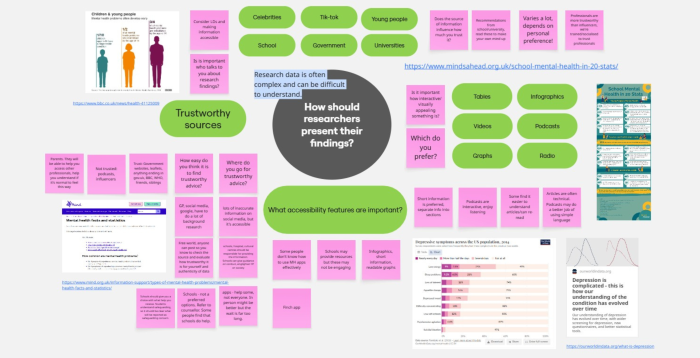Around 20% of the UK population is under the age of 18, yet research and services for children are often developed without input from them. As a result, there is limited understanding of their priorities, including in areas such as mental health. To address this, ARC EoE researchers collaborated with young people to identify topics they believe should be the focus of future mental health research.
Fewer than 1% of published mental health studies impacting children and young people report any form of youth involvement in the research process. This lack of engagement may limit the applicability of research findings and the effectiveness of subsequent healthcare interventions and strategies. With one in five young people in the UK experiencing mental health challenges, their perspectives are vital for shaping research that is both relevant and responsive to their lived experiences.
To address this gap, researchers from the University of Cambridge have partnered with young people aged 11–18 to identify key mental health topics they believe should be prioritised in future mental health research and how researchers can use linked datasets to answer those questions. The project also explored how research findings can be communicated in ways that are clear, accessible, and meaningful to children and young people.
Dr. Jo Reid, Lead Researcher at the University of Cambridge for this study, shares the background to this project:
“Mental health challenges among young people are increasing, often driven by a complex mix of personal and social factors. By using large linked datasets, from health, education, and social sources, researchers can spot patterns, track changes over time, and understand what puts young people at risk or helps protect their mental wellbeing.
Dr. Jo Reid, Lead Researcher at the University of Cambridge for this study
"As a research community, we need to better understand which issues matter most to children and young people, by listening directly to their perspectives. In this study, we’re asking young people directly what questions about their mental health they think researchers should be focusing on, and how we can share our findings in ways that is accessible, and useful to them.”
Dr. Jo Reid, Lead Researcher at the University of Cambridge for this study
The project engaged with 26 young people aged 11 to 18 across four one-hour group discussions focused on mental health and research priorities. Each session began with discussing what research is, the role of public involvement and how linked datasets can be used to explore mental health questions.
Researchers then used two virtual whiteboards to guide conversations, presenting a mind map of mental health topics and asking for suggestions on any missing areas they felt were important. A second mind map explored how research findings could be presented in ways that are clear and accessible to young audiences. The McPin Foundation, a charity committed to involving the public in mental health research, played a key role in connecting researchers with young participants for this initiative.

A virtual whiteboard co-created by researchers and young people to identify topics that should be prioritised in mental health research
In addition to the initial research topics identified by researchers, such as age, gender, school, financial stress, and others, young people added seven themes that they felt should be a focus of research into adolescents' mental health. Young people highlighted that it was important for adults to effectively communicate the difference between general wellbeing and diagnosable mental health conditions. They identified a range of interpersonal stressors, including the impact of peer pressure during adolescence and the complexities of offline friendships. These were discussed alongside broader influences such as family circumstances, like parental separation, the significance of cultural background, and the ongoing effects of national and global events.
While there was strong interest in the impact of digital environments and the positive and negative influences of social media, participants placed greater emphasis on the need for research to focus on improving real-life communities and physical spaces. Their input highlights the complex and interconnected factors influencing mental health, demonstrating that young people’s wellbeing is shaped by a diverse mix of personal, social, and environmental factors, which should be considered when building services and interventions for children and young people. Download the image above here.
“There is increasing awareness about the potential harm caused by online spaces and it’s incredibly important that we see improved policy and legislation to protect children and young people online. However, the young people we spoke to also wanted to convey the importance of their physical environment, including homes, communities, parks, clubs and friendships.
Hayley Gains, Research Assistant of this study
“They felt less confident navigating these spaces, and in some cases young people didn’t feel safe to engage with their physical community. I think this reiterates how important it is that research continues to consider the entire ecosystem around a child, both online and offline.”
Hayley Gains, Research Assistant of this study
Young people emphasised that reports of research findings should be tailored to their intended audience, highlighting the importance of using multiple formats to meet diverse needs and learning preferences. They valued concise written summaries and visually engaging graphs and infographics, as well as podcasts and videos presented in accessible language. Participants also stressed the importance of considering learning difficulties to ensure accessibility. Download the image below here.

A virtual whiteboard co-created by researchers and young people to note preferred methods of presenting research findings
Only a handful of studies have worked with young people to identify and prioritise mental health research topics. However, all of these took place before the COVID-19 pandemic, a period that has since intensified mental health challenges for young people, with rising rates of diagnosable conditions, disrupted education, and increased social isolation. This recent engagement represents a significant milestone in prioritising the voices of children and young people, providing researchers with a more current understanding of the issues they consider most urgent.
“This study matters because it gives young people a genuine voice in shaping the future of mental health research. By centring their experiences and priorities, we can build evidence that is not only relevant but also more likely to lead to services and supports that truly meet their needs. Ultimately, it’s about making sure that the work we do can actually make a difference in their lives.”
Dr. Jo Reid, Lead Researcher at the University of Cambridge for this study
The research team intends to use the insights gathered from this engagement activity to inform and shape future mental health research projects, helping to identify which areas should be prioritised. They also plan to develop a short guide focused on communicating quantitative research findings in ways that are clear, engaging, and accessible to young people.
To hear more about the study, get in touch with Hayley Gains via email hg440@medschl.cam.ac.uk.
